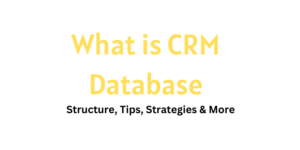
If you’re a business owner, chances are that you’ve heard of CRM. But if you’re like most people, you think it’s just another acronym for something totally unrelated to your business. It’s not! A CRM database is actually a tool that can help your company grow and thrive. In this article we’ll explore what a CRM database is and why it’s so important for any organization to have one in place.
What is a CRM Database?
A CRM database is a database that is used to store information about your contacts. This type of database can be used to store information about your customers, vendors, partners and employees. CRM databases are often used by businesses to help them grow.
There are many different types of CRM databases depending on what type of data they store and how they’re structured. For example:
SalesForce
The SalesForce platform allows companies to track their sales leads and manage customer relationships across channels like email marketing or social media sites like Facebook Messenger or Slack.
Hubspot
Hubspot offers a variety of solutions including social media monitoring tools so you can keep tabs on what’s happening out there online at any given moment in time (or even while you’re sleeping).
ConvergeHub
ConvergeHub’s CRM database is customizable, allowing businesses to tailor it to their specific needs. It also includes features such as lead and opportunity management, sales forecasting, task and activity management, and marketing automation. The platform also integrates with other business tools such as email, calendar, social media, and analytics. It’s an enterprise-grade CRM software that helps SMBs streamline customer management processes, improve their customer service, and drive sales growth.
The Convenience of having a CRM Database
CRM databases help you organize your data so that it’s easy to access and understand. They also give you a single place to track leads, accounts, salespeople and more.
From initial contact all the way through closing a sale. This information helps you identify which customers are most valuable (and how much money they’re spending). You’ll know how fast they move through each step of their journey with your company—and whether there are any obstacles along the way that might slow them down or stop them from making a purchase altogether!
Organization of the database
You need to structure your database correctly for it to be effective. A good structure will encourage people to use it and make it easy for them to find the information they need.
There are a few different ways you can go about this, but here’s one option:
Tips on Structuring Your Data
To make sure that your data is in good shape, it’s important to use a CRM program that is compatible with your business. The program should also be able to store information about your customers and their needs.
It’s also important for you to keep track of the data as it changes over time so that it can be used for marketing campaigns and other purposes. If there are any problems with the system (such as theft), you’ll want to know where they came from so they can be fixed quickly. A backup plan will help if something goes wrong—and make sure everything stays safe!
Common Questions About CRM Databases
If you’re looking to create a CRM database, there are a few common questions that come up. Here are some of the most common ones:
Why is this important?
A CRM database helps you organize your contacts and keep track of their information in one place. It allows you to group contacts by categories such as marketing, sales or support so that they’re easy to find when needed—and it also makes it easier for them to get in touch with each other if necessary!
Resources and Tools to Help You Organize Your Data
There are many different types of CRM systems and tools available to help you organize your data. You can find one that fits your needs, but if you’re not sure what to look for it’s best to consult with an expert before making a purchase decision.
Create a CRM database using an app or template from the company who made it (for example, Salesforce). These are designed specifically for businesses and include features like:
- Automatic generation of reports based on certain criteria (e.g., sales volume)
- Importing data from multiple sources into one central location
Your CRM database is more than just a list of contacts
Keep in mind that a CRM database is more than just a list of contacts. And, it is certainly the one that plays a key role in your business growth.
Many companies use their CRM databases for several purposes:
- Organizing contact information into groups and records (e.g., by company)
- Tracking the interests of individuals in each group or record (e.g., by industry)
- Improving marketing strategies based on behavioral data collected from the various groups or records
The Final Takeaway
You are probably wondering how crucial it is for a SMB to use a CRM database. Many organizations are still unsure whether implementing a CRM would bring productive efficiency. The short answer is that it’s a tool to help you grow your business. It’s not just another list of contacts or numbers on paper—it’s the little things that make all the difference when you are trying to build an amazing marketing team, design creative ads, or sell more products through social media marketing. SMBs that are trying to scale up should start having their own CRM database today so they can better manage their customer relationships and focus on growing their businesses instead of just worrying about their data management system (DMS) issue.






Leave a Reply